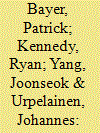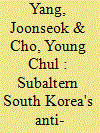| Srl | Item |
| 1 |
ID:
179677


|
|
|
|
|
| Summary/Abstract |
Fuel subsidies in Nigeria are enormous – around USD 3.9 billion – almost double the health budget. Such subsidies come at great cost: the opportunity costs of such spending on other development objectives are large; the distribution of resources to the state governments is reduced; the vast majority of the subsidy goes to better off Nigerians; and cheaper petrol encourages greater pollution, congestion and climate change. Despite this, most Nigerians oppose the reduction of subsidies. We draw on a new nationally representative household survey that asked Nigerian men and women about their knowledge and attitudes towards subsidies. We construct and test a set of hypotheses about the factors associated with support for subsidy reform. We find that those who pay more or who experience less availability of fuel tend to support reform more. On the other hand, people who believe the Government is corrupt or lacks the capacity to implement compensation programs appear strongly opposed to reform. Finally, being religious and the delivery of reasonable national and local services also improves the acceptance of reform. These results support the idea that building a social contract is key to reform success.
|
|
|
|
|
|
|
|
|
|
|
|
|
|
|
|
| 2 |
ID:
171400


|
|
|
|
|
| Summary/Abstract |
Universal household electrification is a key component of the United Nations Sustainable Development Goals, but the evidence base for social and economic impacts of electricity access remains unclear. Here we report results from a systematic review of impact evaluations of household electrification based on five key outcome measures. We only find 31 studies that conduct statistical hypothesis tests to assess impacts. Among these, seven draw on a randomized experiment designed for causal inference. The randomized experimental studies generate fewer positive results than observational or quasi-experimental studies, such as correlational, instrumental variable, and difference-in-differences designs. These results call for a reassessment of what we know about the impacts of household electrification. They also call for major investment in impact evaluation of electricity access using randomized controlled trials, with a particular focus on when and how energy access interventions can furnish large benefits to their intended beneficiaries. Large-scale impact evaluations using experimental methods will require close collaboration between policymakers and researchers.
|
|
|
|
|
|
|
|
|
|
|
|
|
|
|
|
| 3 |
ID:
172803


|
|
|
|
|
| Summary/Abstract |
This article considers the 1950s postcolonial period in Korea after Japanese colonialism and the international context of the Cold War from the standpoint of the ROK and examines how the subaltern South Korean state (re)appropriated and (re)formulated the Cold War discourse of anti-communism in Asia. During that period, South Korea, along with other East Asian states, formed an international association called the Asian Peoples' Anti-Communist League (APACL). During the 1950s, the subaltern ROK thus joined a new, nuanced, Western-centric (if not colonial) structure—the Cold War—and proactively and strategically appropriated anti-communism to ensure its national survival. Carving out a place at the bottom of the Western-centric Cold War hierarchy became part of state building for non-Western South Korea. Moreover, the Cold War was a context in which ideology (anti-communism) mixed with blood (war and violence) on a daily basis. Subaltern South Korea was constitutive of the Cold War in Asia and beyond. Indeed, this article illustrates that the Cold War itself was a co-construction between the hegemonic powers and subalterns.
|
|
|
|
|
|
|
|
|
|
|
|
|
|
|
|